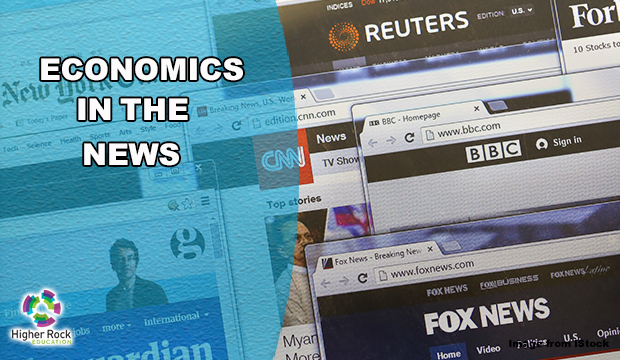
Economics in the News – Nov. 6-12, 2023
Economics impacts our lives every day. Below are some of the top storylines from this past week related to economics.
o Despite the United States Supreme Court striking down President Joe Biden’s decision to forgive up to $20,000 in federal student loan debt for 43 million borrowers, millions of borrowers received surprise notices that their student loans were being eliminated through other government relief programs. So far, 3.6 million borrowers have seen a total of $127 billion in student loan aid wiped out. The money that is being used is from programs that have existed for years, but notoriously had the reputation of forcing borrowers to navigate complicated bureaucratic hurdles.
Four programs stand out as ones being used to cancel loans. First is the Public Service Loan Forgiveness Debts which was created in 2007 to entice more graduates into public service careers. The Income-Driven payment plans are designed to eliminate any remaining balance after a set period of repayment, typically 20 years. The Education Department applied adjustments to plans for all borrowers, resulting in student loans being wiped clean for many borrowers. The Borrower Defense to Repayment and Closed-School Discharge plans were originally created to protect graduates who had received a degree from a college that collapsed, such as the Corinthian Colleges in 2014 or ITT Technical Institute. The fourth program is Total and Permanent Disability, which allows borrowers who are permanently disabled to have their federal student loans eliminated. [The New York Times]
o Credit rating agency Moody’s downgraded its outlook of the United States economy to “negative” from “stable.” While the change was due to the nation’s worsening financial position and political polarization as long-term concerns, Moody stopped short of downgrading America’s credit rating below its highest AAA level. Moody’s outlook suggests that it does not seen an immediate path for the United States to solve its current political predicament.
In August, credit ratings agency Fitch downgraded its long-term US rating to AA+ from its top rating of AAA. Moody’s chose not to downgrade its credit rating for the US due to its economic resilience, the strength of America’s institutions, and the dollar’s role as the world reserve currency. Moody’s negative outlook could be a point of contention politically, as Republican’s have attacked President Joe Biden’s handling of the United States economy. Republicans are pushing for spending cuts to reduce the gap between what America spends and what it earns as tax revenue. [The New York Times]
o Hollywood’s entertainment industry is headed back to work. The Screen Actors Guild-American Federation of Television and Radio Artists and its members agreed to a new three-year contract for film and television stars. The strike ends a historic work stoppage as it marked the first time the two unions had been on strike together since 1960.
The deal is expected to boost minimum payments for actors, a greater share of revenue created on streaming platforms to performers. It also offers a bevy of benefit plans and protections against the unfettered use of artificial intelligence in recreating performances. Executives from top entertainment companies such as Disney, Netflix, Warner Bros. Discovery, and Universal all played a role in negotiations. [Associated Press]
o Modern-day cars come equipped with high-tech features and gadgets, some of which are designed for safety. In the Commonwealth of Massachusetts, Subaru has disabled some of its own software due to a dispute over control of data in your car. For drivers, that means no automatic emergency calls if the car crashes or no wireless notifications from the dealer about maintenance issues. The decision was made by Subaru after a law to let drivers share their car’s wireless repair information with any repair shop, not just Subaru.
Subaru is not alone in turning off remote features for the car, Kia has also made a similar decision. But in a tech-heavy world, it is a lesson that cars are turning into smartphones, where they are controlled by the manufacturer. But if automakers get their wish and only, they can control the data in your car, they have the ability to charge higher prices for services and repairs. [The Washington Post]
o The container shipping industry is returning to its pre-pandemic place, going from record profits to losing money in the space of a few short years. It is a rarity for an established industry that plays a critical role in the global economy to go from historic profits to below break-even levels.
The reasoning is too much supply. The goods demand is returning to pre-pandemic levels while shipping companies have taken the last two to three years to build new, larger ships. Consumers are also being cautious about spending and seeking cheaper ways to have packages delivered. [FORTUNE]